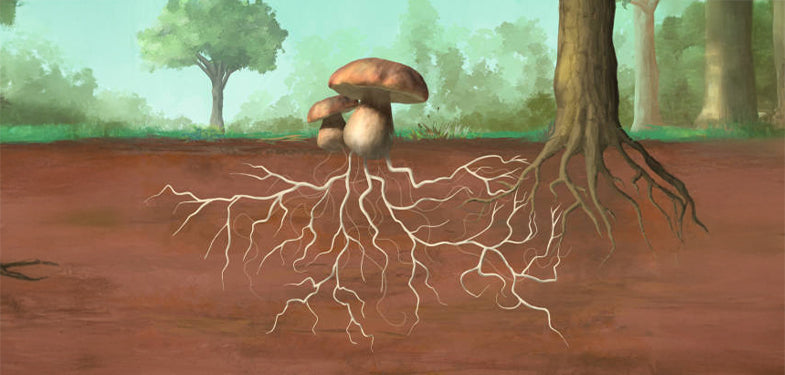

The Complete Nutritional Profile of Mycelium: Detailed Overview
Summary
- Mycelium provides a complete protein with all nine essential amino acids, matching the quality of animal protein.
- Its high fiber content, including heart-healthy β-glucans, supports digestion and cholesterol management.
- Rich in zinc, B vitamins, and bioavailable iron, mycelium boosts immunity and energy metabolism.
- Low in fat and free of saturated fat, it’s a heart-healthy alternative to animal proteins.
- Mycelium’s sustainable production uses minimal land and water, making it a planet-friendly protein source.
Mycelium, the intricate root structure of fungi, is emerging as a powerhouse in sustainable food systems, redefining vegan protein with its nutrient-dense profile. As the star ingredient in Meati’s Eat meati™ products, mycelium delivers a meat-like texture and complete nutrition, making it a premium choice for health-conscious and eco-aware consumers.
Unlike traditional plant or animal proteins, mycelium offers a unique blend of protein, fiber, and micronutrients with minimal environmental impact.
This blog dives into the nutritional advantages of mycelium, showcasing why Meati’s Mushroom Root is leading the charge in plant-powered nutrition.
Nutritional Breakdown of Mycelium

Macronutrients
Protein
Mycelium, like that used in Meati’s products (sourced from Neurospora crassa), delivers 11–12.6 grams of protein per 100 grams. With a Protein Digestibility Corrected Amino Acid Score (PDCAAS) of 1.0, it matches the quality of animal proteins, providing all nine essential amino acids crucial for muscle repair and overall health. This makes Meati’s Classic Steak a robust vegan protein option, rivaling traditional meats in nutritional value.
Fiber

Mycelium contains 5.3–6 grams of fiber per 100 grams, combining soluble β-glucans and insoluble chitin. β-glucans support heart health by helping manage cholesterol levels, while chitin promotes gut health by aiding digestion. This fiber profile offers a digestive advantage over animal proteins, enhancing nutrient absorption and overall well-being.
Fats
With only 1.0–2.9 grams of total fat per 100 grams, mostly unsaturated, and negligible saturated fat, mycelium is a heart-healthy choice. Unlike animal-based proteins, it provides clean energy without the cardiovascular risks associated with saturated fats, making them ideal for health-conscious diets.
Micronutrients

Mycelium is a micronutrient powerhouse. It delivers up to 7.6 mg of zinc per 100 grams, supporting immune function and metabolism. B vitamins, including riboflavin (0.3–0.9 mg), niacin (6.7 mg), and folate (114–150 μg), fuel energy production and cellular health. Its iron content (0.9 mg/100 g) is highly bioavailable due to low phytate levels, making it easier for the body to absorb compared to many plant-based sources.
Bioactive Compounds
Mycelium contains ergothioneine, a unique antioxidant linked to reduced oxidative stress and potential longevity benefits. This compound adds an extra layer of health support, protecting cells from damage and enhancing overall vitality. This makes mycelium not just a protein source but a holistic wellness ingredient.
Mycelium vs. Other Protein Sources
Zinc
Mycelium provides 4.5 mg of zinc per 100 grams, outpacing chickpeas (0.6 mg) and approaching beef (6.1 mg). This makes it a standout vegan source for immune support and metabolic health, addressing a common nutrient gap in plant-based diets.
Saturated Fat
Mycelium contains zero saturated fat, compared to chickpeas (0.2 g/100 g) and beef (1.3 g/100 g). This heart-healthy profile reduces cardiovascular risks while delivering savory flavor, making it a guilt-free alternative to traditional meats.
Sustainability Edge

Mycelium’s production requires minimal land and water compared to beef farming, which demands significant resources. This sustainability edge, combined with its nutrient density, positions mycelium as a planet-friendly alternative that doesn’t compromise on nutrition or taste.
Final Word: Why Mycelium is the Future of Protein
Mycelium is a nutritional and environmental game-changer. It's a complete protein with a high fiber and rich micronutrient profile, featuring zinc, B vitamins, and bioavailable iron, making it a premium vegan protein that rivals animal-based options.
With zero saturated fat and bioactive compounds like ergothioneine, it supports health and vitality. Its sustainable production tackles global challenges like malnutrition and environmental strain, offering a versatile, delicious solution for modern diets.
